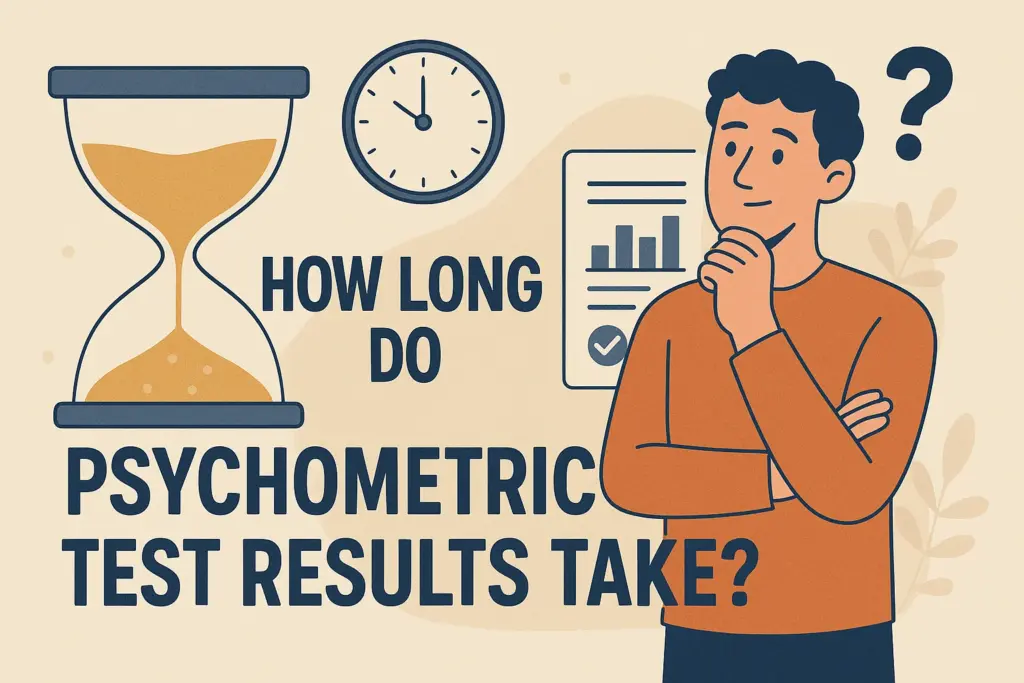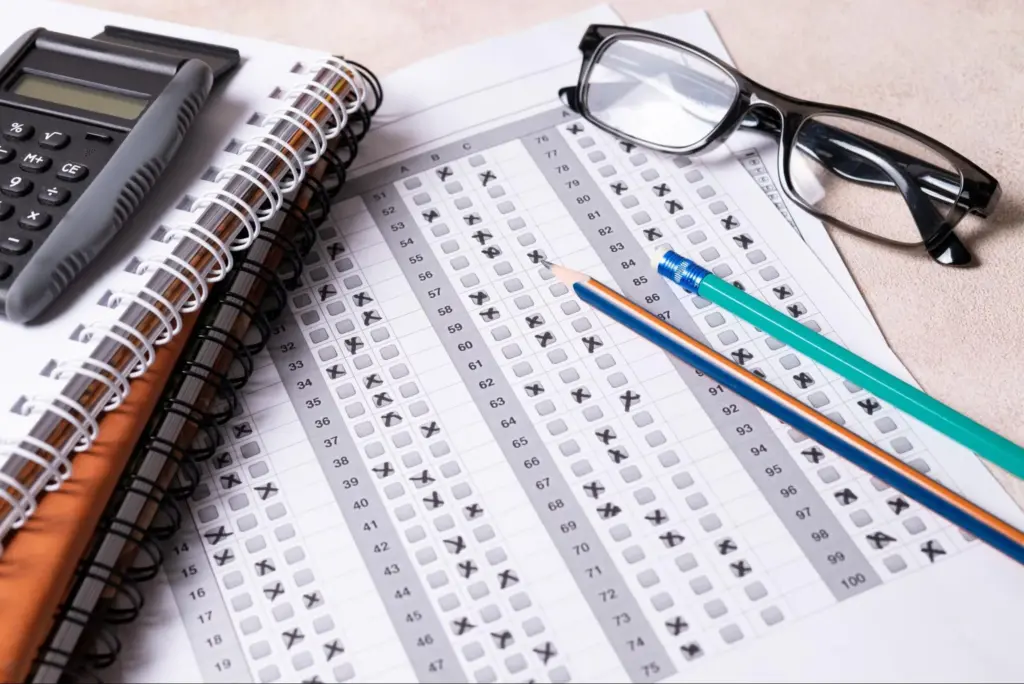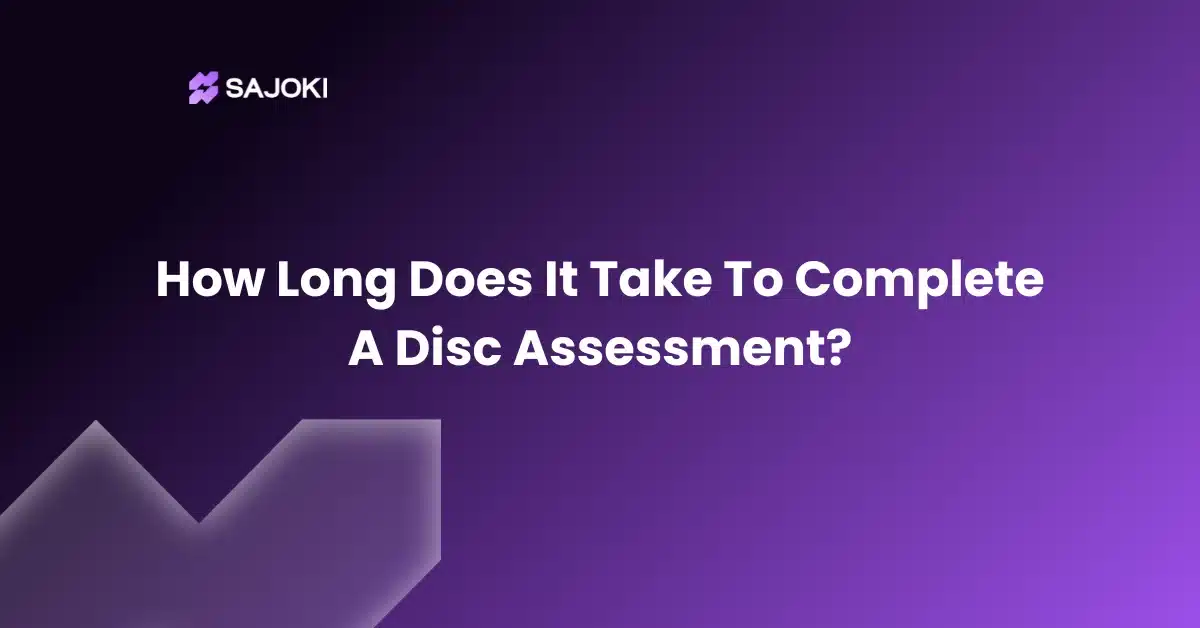Psychometric tests are versatile and are used almost everywhere as they can test personality, skills as well and mental abilities. These tests help with job applications, school placements, and medical diagnoses. However, waiting for results can feel stressful and uncertain.
So, how long does psychometric test results take?
Psychometric test results can take anywhere from a few minutes to several months. Simple online tests provide instant results, while complex psychological evaluations may take 4-8 weeks. Overall, the timing depends on factors like test type, scoring method, and the purpose of testing.
In this article, we will look at how long various psychometric tests take to process, along with the factors that influence the time. Additionally, we’ll cover what to expect in different testing situations. Let’s get started.
How Long Do Psychometric Test Results Take
There are a number of things that affect how long does psychometric test results take. The most important thing is the kind of test you take. Some tests give you results immediately, while others take weeks.
1. Immediate Results (Same Day)
A lot of tests on the internet reveal results right away. Most of the time, these are just simple personality or skill tests. The computer automatically grades your answers. You get your report within minutes after completion.
This is how well-known exams like personality quizzes operate. Tests for basic math or reading skills offer speedy results. However, the tests that give results right away are typically not as thorough as those that take longer.
Most job application tests fall into this category. Companies want to swiftly look at candidates. Therefore, they use tests that score themselves automatically.
2. Short-Term Results (1-7 Days)
More complex tests need human review. Trained specialists need to check the scores on these tests. It takes longer to get the result, but the results are more accurate.
Professional personality tests often need this time (1-7 days) to go through in detail. This also includes clinical tests that check your mental health. Also, careful evaluation is needed for detailed skill assessments.
Furthermore, testing centers require time to make sure everything is right. They check scores over and over to look for mistakes. Nevertheless, most results arrive within a week.
Some tests use humans as well as computers to score. This blend gives you both speed and accuracy. Also, it helps find any flaws in scoring.
3. Medium-Term Results (1-4 Weeks)
It takes a lot longer to do full psychological checks. These tests check a lot of different things at the same time. Psychologists who have been trained must carefully look at the results.
Intelligence tests like the WAIS-IV need expert analysis. Personality tests such as the MMPI-2 require detailed review. Also, examinations for learning disabilities are included in this time frame.
Similarly, it takes time for the professional to write extensive reports. Furthermore, they need to tell you what your scores mean and compare your results to other people.
On the other hand, some tests need more than one session to finish. Scores of separate tests need to be marked individually. As a result, the whole thing takes a few weeks.
4. Long-Term Results (4+ Weeks)
It takes more than a month to finish the most complex tests. Most of the time, these are tests for scientific or clinical purposes. They need highly qualified professionals to interpret the results.
For example, tests like the Rorschach inkblot test that ask you to look at something and guess what it is need a lot of analysis. This is also how long forensic evaluations for court cases take, as accuracy matters the most here.
Tests that are used for research often take longer to get results. While universities and research centers have other work on their hand, adding interpreting results puts a lot of workload on their head. Thus, takes a longer time.
On the other hand, some tests require peer review by other professionals. This extra step makes sure everything is correct, but it ends up taking more time. Nevertheless, makes the overall result more trustworthy.
Overall, the timing is greatly affected by how hard it is to understand. Some results need to be carefully compared to research data. Also, trends that are out of the ordinary may need more study.
Quality control techniques also make things take longer. Multiple professionals may review challenging cases. Even so, this diligent way of doing things keeps mistakes from happening in important decisions.
Existing Relevant Content:
How Do Psychometric Tests Work
Factors That Influence Result Timing
There are a number of things that can speed up or slow down the delivery of your test results. Knowing these things will help you make better plans in terms of test results time. Also, it tells us why some people receive results faster than others. Let’s start.
1. Test Type and Complexity
The volume of questions has a big effect on timing. Tests with 50 questions are graded faster than tests with 500 questions. However, the type of question is more important than the number of questions.
Within minutes, multiple-choice tests are automatically graded through software. However, when it comes to open-ended questions, it needs human review. Additionally, it takes the greatest time to grade essay answers as the word count is larger and is checked by humans.
Similarly, custom tests built for specific companies take longer than standard tests use scoring systems that are already in use. Nonetheless, customized tests typically give you more useful information.
Tests that only measure one skill don’t take long. So if it’s a single test skill, you can expect results within a short period of time.
2. Administration Method
Online tests usually give you results faster than paper tests. As soon as you submit your answers, the computers score them. On the contrary, paper tests must be scanned or entered manually first, which adds time to the process of obtaining the results.
Self-administered tests often score faster than supervised ones. You can take them whenever you want, without having to make an appointment. Also, testing staff don’t have to wait for their turn.
Testing in groups can make results take longer. The testing facility has to look at everyone’s responses at the same time. Because of this, your results may have to wait for other people to finish.
Individual testing allows for immediate processing of your specific results. Nevertheless, it requires more staff time to administer properly.
3. Scoring and Interpretation Requirements
The fastest results come from computer scoring. Algorithms figure out scores within seconds of the test being done.
Scoring by people takes a lot longer, but it gives you more information. People who have been trained can find mistakes that algorithms miss. However, this personal attention requires scheduling and availability.
On the other hand, some examinations need licensed specialists to use their clinical expertise. These specialists are quite busy and don’t have much time to spare. Therefore, results depend on their current workload and priorities.
4. Volume and Workload
Busy testing centers take longer to process results. When there is a lot of demand, there are backlogs that slow down everyone’s results. Some facilities, on the other hand, hire temporary workers during busy seasons. So you can opt for those facilities for faster results.
In short, the time is greatly affected by changes in the seasons. There are delays during back-to-school and employment seasons. However, planning beforehand can help you stay away from these busy times.
Certain organizations give priority to urgent requests for extra fees. Processing in an emergency can minimize the wait time by half. Nevertheless, urgent services cost more and aren’t always accessible.
5. Purpose and Setting
Testing for jobs frequently puts speed ahead of thorough investigation. Companies want to hire people rapidly. Because of this, job-related exams usually give results faster than clinical ones.
On the other hand, clinical evaluations need to be looked over and understood more carefully. Making decisions about healthcare requires careful and complete analysis. Because of this, medical tests usually take longer than job screenings.
Different Contexts and Their Typical Timelines
Now that you are aware of how long does psychometric test results take and the factors that influence them, let’s check out the typical timelines in different contexts.
| Testing Context | Assessment Type | Typical Timeline |
| Employment | Job screening tests | 24-48 hours |
| Executive assessments | 2-4 weeks | |
| Educational | Learning disability tests | 3-6 weeks |
| College entrance exams | 2-4 weeks | |
| Clinical | Mental health screening | 1-2 weeks |
| Comprehensive evaluations | 4-8 weeks | |
| Healthcare | Medical clearance tests | 3-7 days |
| Neurological assessments | 4-6 weeks | |
| Research | Study assessments | Highly variable |
How to Accelerate Results When Possible
You might be able to get your test results faster at times. But not all tests let you rush through them. Also, as already mentioned, processing things quickly usually costs more.
1. Communicate Your Urgency
Tell the testing center why you need the results right away. Job offers and medical appointments are common urgent reasons. Nevertheless, be honest about when you need things done.
Many centers will give priority to genuine circumstances. But they need to know ahead of time if you want faster service. Additionally, urgent cases may be processed on weekends.
2. Choose Faster Test Options
Most of the time, online tests give you results faster than paper tests. Automated scoring gets rid of delays caused by human reviews. Moreover, digital reports are generated immediately after completion.
Some testing institutes are known for how quickly they can get results. Do some research on different providers before making an appointment. Also, ask them how long it usually takes to process things.
3. Prepare Thoroughly
Finish all of your paperwork before your test. Your results could take a lot longer if you don’t have all the information ready. Also, be there early to avoid problems with your schedule.
Bring the necessary paperwork and identification with you. If you forget something, your testing appointment may have to be put off. Moreover, rescheduling often means waiting weeks for a new appointment.
4. Work With Experienced Centers
Results are usually processed more quickly at established testing sites. They have made their systems more efficient and have enough staff to process the results faster. Nevertheless, newer centers may offer competitive rush services to attract clients.
FAQ
1. Can I request a copy of my raw test scores?
Yes, you usually can request your raw scores. However, most professionals provide interpreted reports instead of raw numbers. Moreover, raw scores without proper explanation can be misleading.
2. What happens if my test results get lost or delayed?
Testing centers keep backup copies of all completed tests. Lost results can usually be recreated from your original answers. However, this process may add extra time to your wait.
3. Do weekends and holidays affect my result timeline?
Yes, weekends and holidays can extend your waiting time. Most testing centers don’t process results these days. Moreover, holiday periods often create backlogs that slow everything down.
Conclusion
To conclude, we hope you got the answer to how long does psychometric test results take. Simple online tests provide instant feedback, while comprehensive evaluations require weeks of careful analysis. Thus, it’s essential to understand the different timeframes and plan accordingly.
Always remember that longer processing times usually mean more thorough and accurate results. Quality assessment requires time for proper analysis and interpretation. Nevertheless, you can sometimes speed up results by choosing faster test options or communicating urgency.










